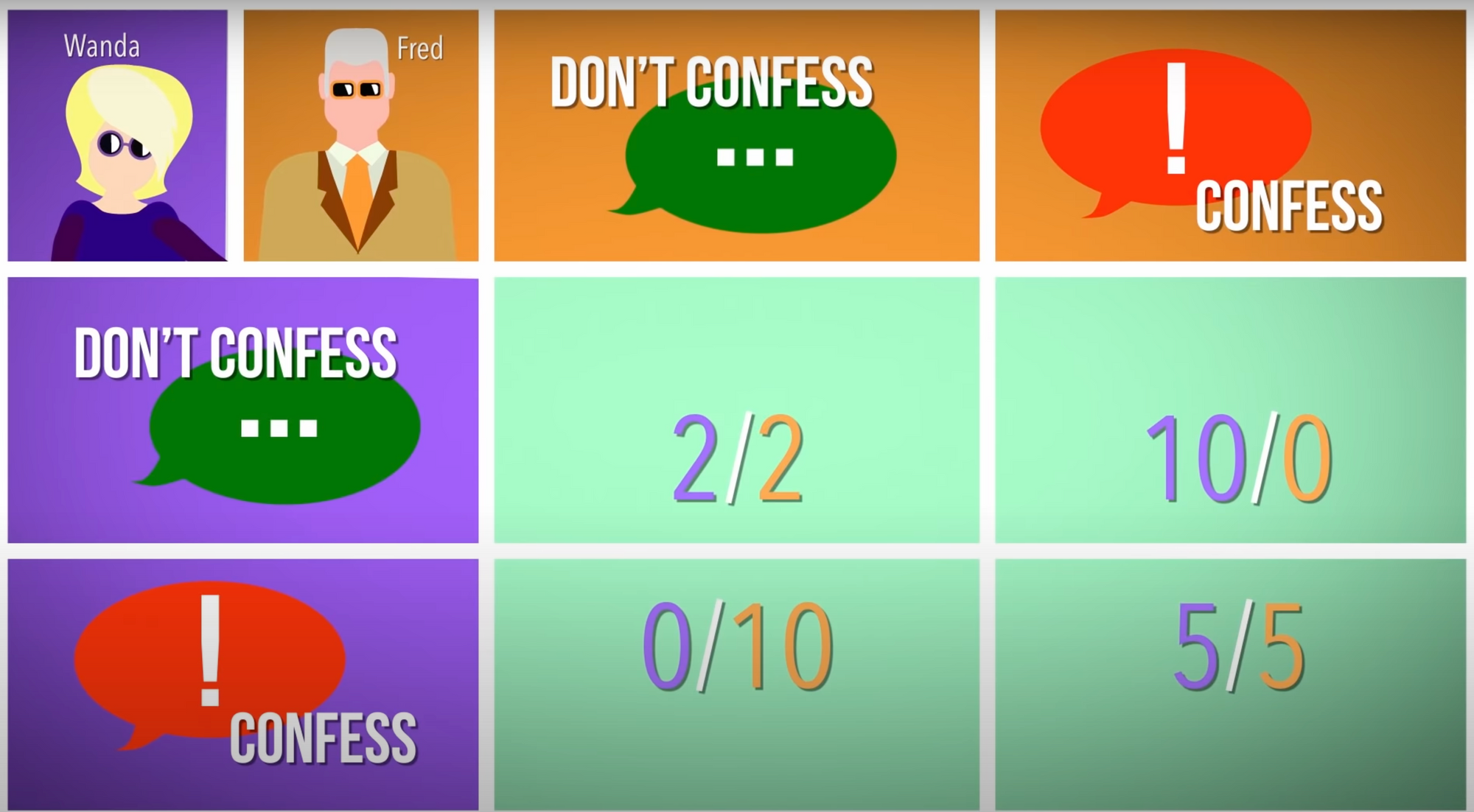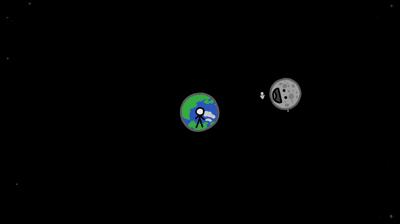In this series of posts, I'm planning to explore some cool concepts and ideas that catch my eye in science, math, health, wealth, entrepreneurship, economics, psychology, productivity, happiness, emotions and beyond. If there is a particular concept that interests you, hit me up and we can go deep, brainstorm and learn more. If there are any contradictory opinions or articles regarding the concepts I share, I'd love to learn more about those as well. Here we go!
- Game Theory
- The Spotlight Effect
- Principal Agent Problem
- Ignorance of ignorance
- Tidal Locking
Game Theory
Game theory is a branch of applied mathematics that provides strategies and tools for determining the outcomes of games involving two or more players, their decisions, payoffs and outcomes. Before getting into details, let's define some terms.
- Game — Any social situation where the outcome of the situation is based on the decisions of the players and the payoffs they earn.
- Player — Anyone who participates in the game.
- Payoff — Any payout that the players receive as a result of an outcome. This payoff is directly affected by the decisions of the other players. Examples of payoff: Money, assets, services, fame, penalties, etc.
- Strategy — A set of decisions made by the player while intending to get to an outcome.
- Equilibrium — A state reached at the end of the game where there is an outcome as a result of the strategies by the players.
Game theory was originally introduced by mathematicians John von Neumann and Oskar Morgenstern to study economics and further pioneered by John Nash (the guy that Russel Crowe played in A Beautiful Mind) in the 1950s. Game theory is a vast area but let's try to grasp the basic idea with an example called the "Prisoner's Dilemma".
We have two prisoners Wanda and Fred who have been caught for a crime and they have been sentenced 2 years in prison. But they are both given more options separately to give up more information without the knowledge of the other. If one of them confesses and rats out their partner, he/she gets immunity for cooperation (no prison sentence) and the other person gets 10 years in prison. If both confess, they will both get 5 years in prison. But if neither of them confesses, their current sentence stands and they both get 2 years in prison. Let's construct a matrix to represent this situation.

If we are either one of them, this might seem like an easy choice at the first glance — to shut up, serve 2 years in prison and get out. Except, it's not. Not when there is a possibility of the other person confessing, resulting you a 10-year sentence. They are criminals and they don't trust each other to think that the other person will shut up too. So Wanda and Fred should make a decision that should benefit themselves irrespective of what the other person chooses. In this situation, no matter what the other person does, the most optimal thing to do for either of them would be to confess because it gives them a possibility of either going free, or spending 5 years in prison. If they don't confess, they can either spend 2 or 10 years in prison which is worse. So, the solution of game theory is that both will confess separately and serve 5 years in prison. This outcome where the players strategize for themselves to win the game irrespective of the other players' choices is called the "Nash Equilibrium".
This is an example of a competitive game. So when competing with others, it makes sense to choose a course of action that benefits you the most, no matter what the others choose to do. There are also cooperative games where all players share a common goal. Any kind of coalition between players is a cooperative game — countries cooperating to fight climate change, scientists and pathologists across the world collaborating to fight a pandemic, etc. There are many other types of games in game theory and it is applied in many areas including economics, biology, social sciences, politics, psychology, military, etc. It can be applied to any social situation that involves people interacting with each other.
The Spotlight Effect
We have all been in social situations where we have felt conscious about how we carry ourselves. We spend a lot of time deciding on what we wear, how we're going to talk before going to a public place or a social event. Some of us are conscious of our behaviors as well. While it's a good thing to carry ourselves well for our own good, being over-conscious sometimes becomes stressful and causes social anxiety. This is a psychological phenomenon called the Spotlight Effect, which is the tendency to believe we are noticed by others more than we really are. However, the reality is that others have this too and they are focused on themselves. They have their own lives and problems. Nobody is focusing on us as much as we think and it's okay to let go a little and live freely, not obsessing about how others think of us and perceive us. We are humans and we can't totally ignore others' perception of us, but the awareness of this could help us in some situations.
Principal-Agent Problem
Let's try to define Principal and Agent before going into the problem.
- Principal - A person who owns an entity like an asset, a task or a business.
- Agent - A person who is hired by the principal to work on the entity.
The Principal-Agent problem is a conflict of interest between the two parties where the Agent is not working for the best interest of the Principal. Some examples of Principal-Agent relationships are plaintiff-lawyer, employer-employee, home owner-contractor, voter-government representatives. The conflict arises when the person (Agent) who is hired doesn't care enough about the job as much as the person who would like to get the job done (Principal). This results in the Agent working/billing more hours due to lack of efficiency and thus incurring more costs for the Principal. These are called as Agency costs.
This can be solved only by the Principals as they are the ones who need to get the job done. One way to solve this conflict is the idea of "If I want to get it done right, I'll have to do it myself". However, it's not practical or feasible for the Principal to work on something directly in all situations. One of the better ways is to find how a Principal can make an Agent feel like a Principal. This could be done by efforts to incentivize the task better, make the Agent feel important and included, give them more accountability in a work setting. If people feel responsible, they are more inclined to care about the task and be efficient.
Viewing this from an agent's perspective (an employee, a home contractor or a freelancer), thinking like a Principal to solve this by taking on more responsibility and accountability can contribute to professional growth. For people who are dreaming to start their own business someday, thinking like a Principal might pave the way to becoming a Principal and tackle this conflict when they do. This problem exists in the society in variable scales and solving this problem even in small possible ways will help us move forward.
Ignorance of ignorance
Are we as good at things as we think we are? Our competency directly contributes to our self esteem, how we make intuitive decisions and when to seek help. But according to psychological research, we tend to overestimate our abilities more often than not. This also applies to day-to-day things like driving, using good grammar, managing money/people, etc. Apparently, this is a widespread cognitive bias called the Dunning-Kruger Effect.
People with least ability tend to overrate themselves the most. For example, when we are learning something new, we tend to make mistakes that leads to poor decisions, but we lack enough knowledge to assess how badly we are doing in the first place. So we think that we haven't made as many mistakes as we actually did. First there is the ignorance to the subject, then it doubles down as ignorance of the ignorance that makes us overestimate ourselves. People with moderate amount of expertise tend to underestimate themselves because they know enough to know what they don't know. True experts in the fields suffer from a different kind of curse. Though they are aware of their competence and limits, they tend to think that others are as knowledgable as they are, which stems into another kind of ignorance. One way or the other, almost all of us are susceptible to inaccurate self perception.
Thankfully, this is not the matter of ego blinding our awareness. Most people admit their mistakes when they take an objective or a retrospective assessment. The key to closing these gaps is to keep learning and testing ourselves frequently. Another way is to ask for feedback and consider it even if it's hard to digest. This is powerful because it nudges us to learn and be better.
Tidal Locking
Tidal locking comes into picture when one astronomical body revolves around another. It is a phenomenon by which the rotational and orbital periods of an astronomical body are the same around its partner. This is due to the gravitational effect of the bodies on each other. The simplest example is the moon. It rotates at the same rate as it orbits the earth i.e., one day and one year in the moon are the same. The resulting effect is what blew my mind — the moon always shows the same face to the earth. We have never seen the other side of the moon from the earth and we never will.




